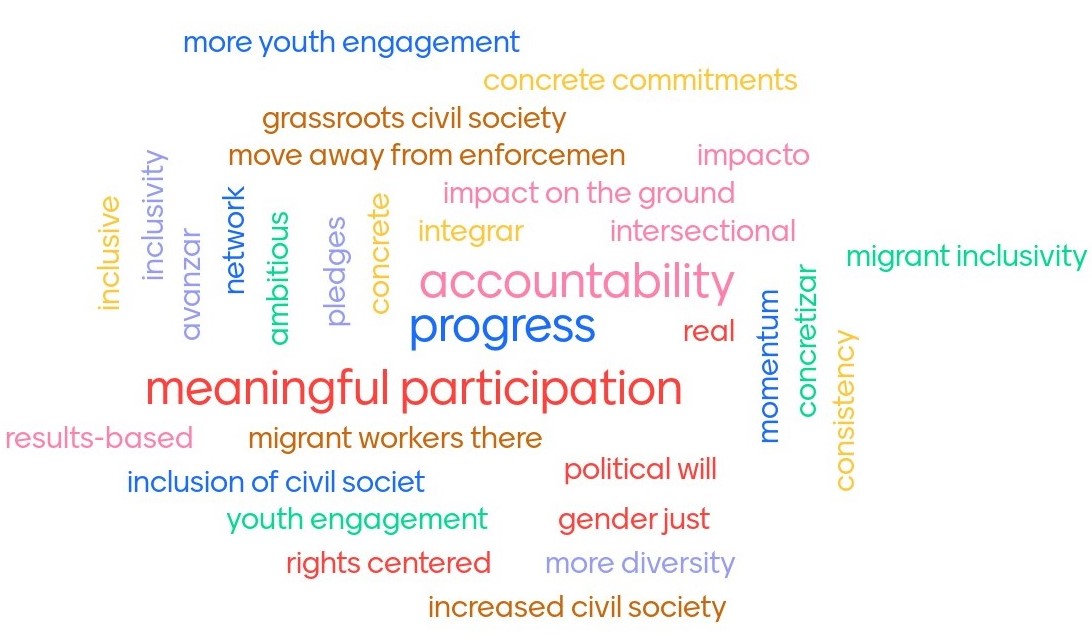Building from the Ground Up: Regional Reviews as a Vehicle for Delivering on the Commitment to Migrant Participation in GCM Implementation

Building from the Ground Up:
Regional Reviews as a Vehicle for Delivering on the Commitment to Migrant Participation in GCM Implementation
By Maria Kamenias and Laurel Townhead, Human Rights & Refugees Programme at the Quaker United Nations Office (QUNO).
“Nothing about migrants without migrants” was a call echoed from the highest levels in the first International Migration Review Forum. The upcoming Regional Migration Reviews are an opportunity to make sure this is not hollow rhetoric. Centering migrants’ experiences and expertise in every stage of implementation of the Global Compact for Migration(GCM) and at all levels - from designing policies to evaluating on-the-ground impact - is integral to achieving the GCM’s objectives and upholding the commitment to human rights-based migration governance.
Meaningful migrant participation can help make sure discussions and decisions are grounded in and responsive to the human realities and human costs of migration policy. So, migrant engagement is good for the Regional Reviews, but is engagement in the Regional Reviews good for migrants? We believe it can be when seen as an opportunity to work for migration justice:
- Testing Progress and Driving Change
- The Regional Reviews provide an opportunity for migrants and migrant-led civil society organizations to evaluate tangible progress in the GCM implementation. These Reviews are not just about reviewing but about driving continuous improvement.
- The Regional Reviews provide an opportunity for migrants and migrant-led civil society organizations to evaluate tangible progress in the GCM implementation. These Reviews are not just about reviewing but about driving continuous improvement.
- Human Rights-Based Approach to Action
- The Regional Reviews offer a strategic avenue for advancing a human rights-based approach to migration governance. The Reviews can help shape roadmap for implementation that uphold human rights obligations.
- The Regional Reviews offer a strategic avenue for advancing a human rights-based approach to migration governance. The Reviews can help shape roadmap for implementation that uphold human rights obligations.
- Catalyzing Cooperation and Engagement
- The Regional Reviews are not isolated events, but part of an ongoing process and catalysts for change that can foster meaningful migrant participation at all levels. They create platforms for networking, knowledge-building and sharing of best practices.
The aim is not just improvement of migrant participation in the Regional Reviews, but improvement through the Regional Reviews – the measure of success should not be limited to the number of migrants participating in the meeting itself, but how the processes expand the role of migrants in decision making at local, national, regional and global levels. Our practical guide on migrant and civil society engagement with the Regional Reviews sets out possible aims of engagement including:
- Sharing good practices and knowledge-building on migration governance for potential replication and scaling up – are you involved in something that is making a positive difference in migrants’ lives? Showcasing this through the Regional Reviews could help it reach more people.
- Engaging with States, intergovernmental organizations, and other stakeholders for multilevel and multilateral cooperation – who else is active on the topics you work on? The Regional Reviews can be a platform to facilitate networking and dialogue with key actors.
- Following up on pledges made at the IMRF and its Progress Declaration – have States committed to specific improvements for migrants? The Regional Reviews can be a place to remind them of these commitments and strengthen accountability.
While we view the Regional Reviews as a useful tool for enhancing human rights-based migration governance, it is not perfect and the process itself requires a conscious effort to facilitate inclusivity and transparency. Recommendations on this are further detailed in our briefing paper on enhancing meaningful migrant participation at the Regional Reviews; these include:
- Consulting with migrants to identify key topics for discussion, speakers, and formats that will facilitate participation.
- Ensuring timely information sharing in relevant languages and formats so that efforts are accessible globally.
- Working with migrants and civil society to develop indicators/metrics to measure meaningful participation and use these to assess the Regional Reviews and inform preparations for future processes.
At the mid-point between the first and second International Migration Review Forums (IMRF) the Regional Reviews are a valuable opportunity to bridge words and action. As outlined in the recent Friedrich Ebert Stiftung report on reflections from the first IMRF, work to expand and democratize stakeholder space should be maintained and developed. The Regional Reviews will feed into the second IMRF and can influence the process and outcomes. If the call for ‘nothing about migrants without migrants’ is answered, the Reviews can be a pivotal moment in showing that commitments can transform into concrete measures, guiding us towards more just migration governance.
The Quaker United Nations Office’s Human Rights and Refugees Programme focuses on migration justice; working on, with and through international law and multilateral processes (primarily at the UN) to honour the inherent dignity of all people regardless of the borders they have crossed and why they have crossed them.
This piece is published as part of the UN Network on Migration’s Guest Blog Series and does not necessarily represent the views or opinions of the UN Network on Migration nor its Secretariat.